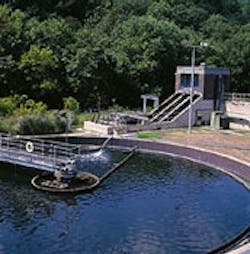Public-Private Partnership Perfect for Pennsylvania Borough
In 1994, the borough of Boyertown, Pa. was faced with the dilemma of replacing two employees approaching their retirement. First was the wastewater treatment plant manager, the only one to ever work for Boyertown, and the second employee that needed to be replaced was the surface water treatment plant manager.
The borough was unsure to how to replace the knowledge these two gentlemen had of their respective facilities. In addressing the challenge, the borough manager investigated alternatives to traditional public works management.
The result was a public-private partnership that immediately yielded savings totaling $500,000, and an additional annual savings of $60,000 since the partnership began.
The Boyertown system
The borough’s wastewater system serves only the residents of Boyertown. It includes 20 miles of collection lines, one lift (pump) station, and a 0.75-mgd treatment plant. The water system serves residents, as well as a few thousand customers in surrounding vicinities. The system includes a 1.9-mgd surface water treatment plant, two raw water reservoirs totaling 400 mg with more than 700 acres of watershed, two 1-mg storage tanks, one 0.1 mg standpipe, one booster station, and 25 miles of water distribution lines. The combined facilities serve nearly 7,500 residents.
Following a competitive bidding process, the borough selected Severn Trent Services for operations and maintenance of the facilities. In addition, Severn Trent would also provide water and sewer line repair for the borough, as well as maintenance, watershed protection, capital projects management, and customer service.
The partnership begins
Upon inception of the contract, Severn Trent first implemented changes to chemical feed, solids management and process control programs to improve wastewater treatment and reduce costs. Seven Trent spent significant time in the first year bringing the facility into compliance and operating efficiently. More importantly, Severn Trent determined the borough’s preliminary plans for additional tankage and filters were unnecessary.
Prior to the partnership, the borough was considering capital improvements estimated at nearly $500,000. Instead, Severn Trent recommended removing trickling filters and multimedia filters from service because the system was achieving regulatory compliance without them. The elimination of the filters has saved the borough $60,000 annually, while at the same time improved discharge quality. Treatment for the borough’s drinking water was also optimized by changes in chemical treatment, automation, and employee development and training.
The results of the partnership go beyond cost savings. For the calendar year 1997, the water treatment plant received a commendation from the Department of Environmental Protection for meeting all maximum contaminant level, monitoring, and treatment technique performance requirements.
In 2003, the facility earned the Pennsylvania Water Environment Association’s Facility Safety Award. In late October of this year, the First Deputy Mayor and General Director of Water Supply for the Rostov-on-Don region of Russia toured the Boyertown facilities during a trip to the U.S. in order to learn more about public-private partnerships.
According to Marc DesAutels, area manager for Severn Trent Services and the supervisor of the Boyertown facilities, public-private partnerships are increasing in number because “they work.”
“The results are undeniable,” said DesAutels. “Unlike privatized systems where assets are sold or transferred to the private sector, the public partner remains in charge in a public-private partnership. Assets are owned by the municipality, the management of the assets is controlled by the municipality, and, more importantly, user rates are established by the municipality.”
Municipalities in the U.S. first began outsourcing the operation of publicly-owned wastewater facilities to private companies over 30 years ago. According to the Water Partnership Council http://www.waterpartnership.org today more than 2,800 public-private partnerships exist today in the U.S. today.
With tightening budgets, increasing environmental standards and aging infrastructure, many municipalities can’t match the resources a private partner can provide. For small- to mid-sized municipalities like Boyertown, a public-private partnership may be the answer.
